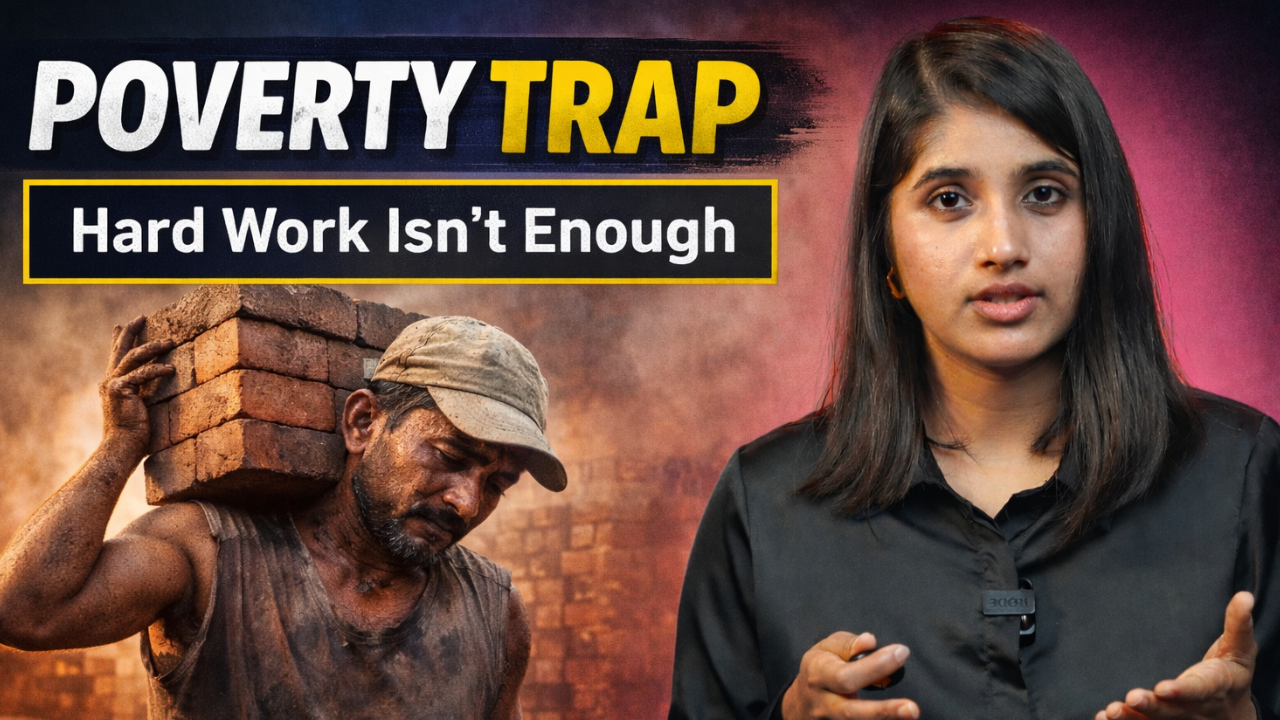
Why Millions Stay Poor Despite Working Hard
If hard work alone could end poverty, the poorest people in the world would be the richest. Yet millions remain trapped in poverty for generations. Why? In this episode of Newsreel Asia’s explainer series “We the People,” Harshita Rathore examines why poverty cannot be reduced to individual effort or personal choices. Instead, the deeper causes lie in structural inequality, inherited disadvantage, and economic systems that reproduce gaps across generations. We explore key ideas such as path dependency, the Great Gatsby Curve, and the concept of a poverty trap showing how the conditions of birth shape access to education, healthcare, land, and income. The episode also examines how caste, gender, landlessness, weak labour protections, and unequal wealth transfer reinforce long-term inequality. Many of the world’s poorest people are already working long hours. The issue is not effort it is low wages, unstable employment, lack of public services, and policies that fail to protect the vulnerable. Drawing on the ideas of economists like Amartya Sen and Thomas Piketty, this explainer shifts the focus from blaming individuals to questioning institutions and public systems. Watch till the end and tell us, do you think poverty is a personal failure or a structural problem?

Bangladesh Elections 2026 | Issues, Fears and Islamic Radicalisation
On 12 February 2026, the country will vote in its first national parliamentary election since the July 2024 student protests, which began over government job quotas and quickly escalated into a nationwide movement demanding political change. The unrest ultimately led to the ouster of Prime Minister Sheikh Hasina after 15 years in power and the formation of an interim government under Nobel laureate Muhammad Yunus. This election is being closely watched not just within Bangladesh, but across South Asia and beyond. While it will determine the country’s future governance and political direction, it is also deeply controversial. The Awami League, the former ruling party, has been barred from contesting, raising serious questions about democratic legitimacy, representation, and fairness. As voters head to the polls, they are navigating a complex mix of hope and fear—hope for meaningful political change, and fear of instability, violence, and the safety of minorities during the election process. In this interview, we speak to award-winning journalist Zia Chowdhury, a staff correspondent at The Business Standard, who has been reporting on Bangladesh’s politics, human rights, law enforcement, crime, and diplomacy for over a decade.
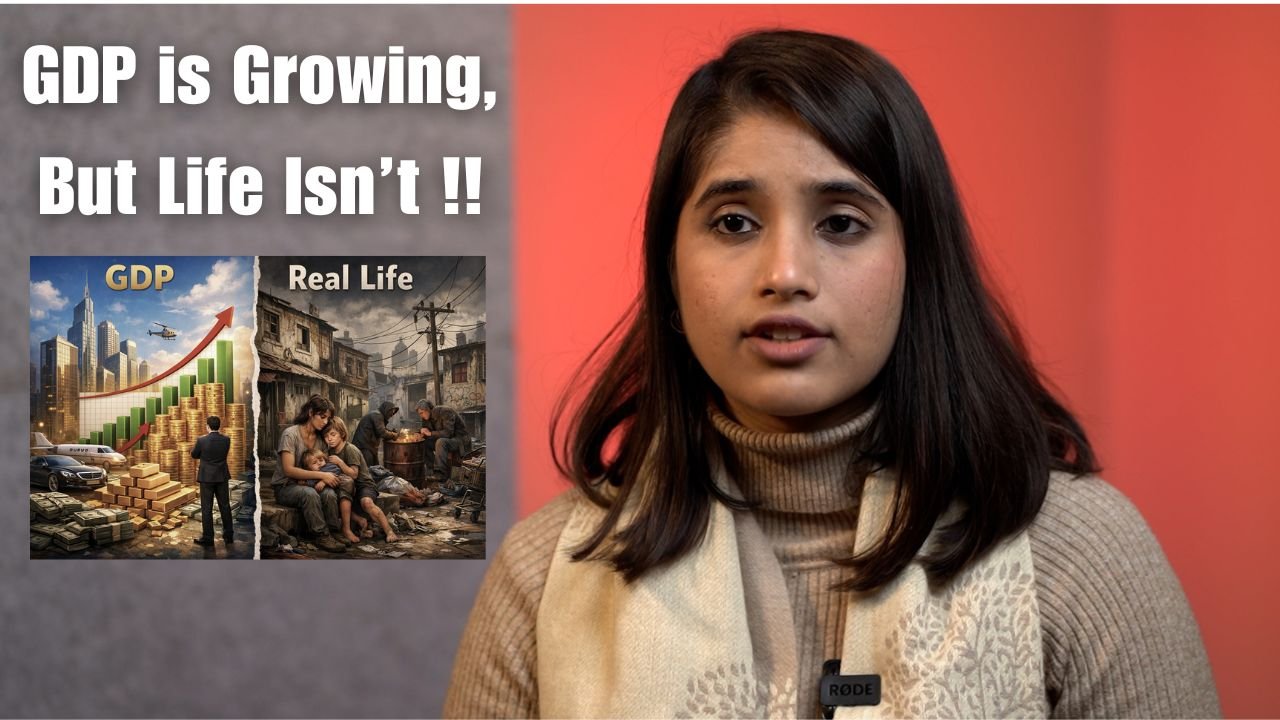
What GDP, Rankings & Statistics Don’t Tell You About Real Life
Governments often point to rising GDP, higher per capita income, and global rankings to claim that the economy is doing well. But do these numbers actually reflect how ordinary people live? If GDP grows by five percent, does life really improve by five percent for everyone? In this episode of We the People, we look beyond headline statistics to understand what economic “growth” truly means for people on the ground. Using simple examples—from wages and employment to gig work, nutrition, and cost of living—this video explains why commonly used economic yardsticks can be misleading. Growth can happen without fairness. Employment can rise without dignity. Incomes can increase while purchasing power falls. Drawing on ideas by economist Amartya Sen, we explore why development must be measured by people’s real freedoms, security, and ability to live with dignity. Because progress that cannot be felt, shared, or sustained is not progress at all.
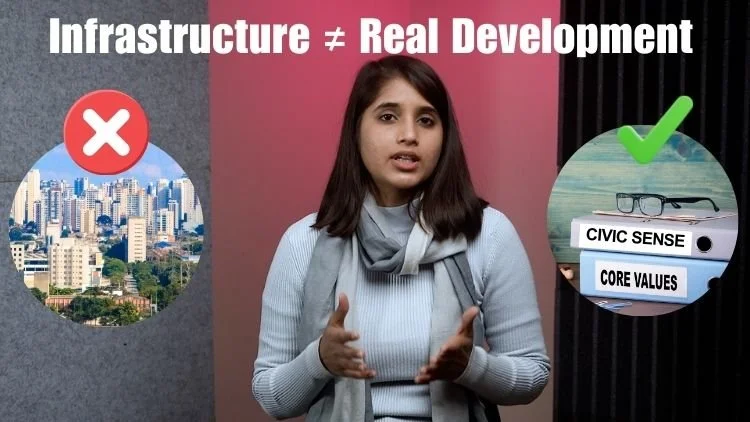
Know the Real Meaning of Development Beyond Roads and Buildings
When we think of development or vikas, we often picture highways, airports, metros, and tall buildings. But do these visible symbols really tell us how well a country is doing? In this explainer, Newsreel Asia looks beyond concrete and steel to ask a deeper question: does development only mean infrastructure, or does it also mean freedom, trust, and dignity? Drawing on ideas from thinkers like Amartya Sen, Robert Putnam, and Douglass North, this video explores why real progress is about expanding people’s choices and improving the quality of public life. True development is reflected in everyday behaviour — civic sense, ethical conduct, trust in institutions, and a willingness to do the right thing even when no one is watching. From how societies handle crises like COVID-19 to how citizens treat shared spaces, this episode explains why values and social norms matter as much as economic growth. So as India builds new roads and cities, the bigger question remains: are we also building a stronger collective conscience?

You Can Care About Politics Without Supporting a Party
Political engagement is not the same as political loyalty. Yet in today’s hyper-polarised world, many of us confuse supporting democracy with supporting a political party. In this episode of Newsreel Asia’s Explainer Series, Harshita Rathore breaks down what political engagement really means—and why being politically aware does not require blind loyalty to any party or ideology. Have political disagreements cost you friendships? Do debates with family turn into heated arguments? Do politics feel exhausting, emotional, and deeply personal? This video explains: What political engagement actually means Why party loyalty weakens democracy How polarisation affects citizens and public debate The difference between being a political supporter and an active citizen How informed, critical participation strengthens democratic systems Using insights from political theory, democracy studies, and everyday examples, we explore how citizens can stay engaged without becoming partisan, and why questioning power—no matter who is in office—is essential for a healthy democracy. This explainer is for anyone trying to understand Indian politics, democracy, civic responsibility, and citizen participation beyond social media arguments and TV debates.

You’re Not Aware of This Corruption — It’s Not About Money
Corruption is often imagined as bribes, cash-filled envelopes, or stolen public funds. But today, scholars, legal experts, and real-world events are forcing us to rethink this definition. Corruption is no longer just about money — it also includes deliberate inaction, selective enforcement, and the betrayal of public duty. In this explainer, we unpack how a new idea has quietly entered the meaning of corruption and why it matters for every citizen.

How is Bhutan Leading the World Spiritually?
Bhutan hosts the first-ever Global Peace Prayer Festival 2025 in Thimphu, held in continuation of the celebrations marking the 70th birth anniversary of His Majesty the Fourth King, Jigme Singye Wangchuck — the visionary behind Gross National Happiness. The two-week festival brings together spiritual leaders, monks, and practitioners from around the world to offer prayers for peace, compassion, and global harmony. The event features powerful rituals such as the Jabzhi Dhoechog, Bazaguru mantra recitation, and the Kalachakra Empowerment led by His Holiness the Je Khenpo. It also marks historic milestones, including the ordination of over 250 Buddhist nuns, symbolizing inclusivity and empowerment. Buddhism, founded by Siddhartha Gautama—the Buddha—is a spiritual tradition centered on compassion, mindfulness, and the path to liberation from suffering. Over time, it evolved into three major sects. Theravada, practiced mainly in Sri Lanka and Southeast Asia, preserves the earliest teachings and emphasizes individual enlightenment through meditation and discipline. Mahayana, widespread in East Asia, focuses on the Bodhisattva ideal—seeking enlightenment not just for oneself but for all beings. Vajrayana, prominent in the Himalayas including Bhutan and Tibet, uses advanced rituals, mantras, and tantric practices to accelerate spiritual transformation. Together, these traditions reflect Buddhism’s rich diversity while sharing the same core message: awakening through wisdom and compassion.All three major Buddhist traditions — Theravada, Mahayana, and Vajrayana — are coming together to participate in this peace prayer programme. Their unified presence makes the festival truly historic, as it brings diverse Buddhist lineages under one roof to offer collective prayers for harmony, compassion, and global peace. With Prime Minister Narendra Modi joining the celebrations, the festival stands as a profound expression of Bhutan’s spiritual heritage, unity, and its enduring message of peace to the world.

Will Faith Allow Reform? The Future of Nepal’s Kumari Pratha
Will the centuries-old tradition of the Kumari — Nepal’s living goddess — ever reform with time?
Harshita Rathore explores the deeply rooted practice of Kumari Pratha, where a prepubescent girl from the Newar community is worshipped as the living embodiment of Goddess Taleju. Chosen for her purity and perfection, the Kumari is revered as divine until she begins to menstruate — a moment that abruptly ends her sacred status.
Through history, the practice has stood as a symbol of faith and culture, yet it also raises pressing questions about gender, childhood, and the right to live with dignity. The Nepal Supreme Court’s 2008 ruling brought some reforms — including access to education and healthcare — but is that enough?
To understand the path forward, Harshita speaks with activist Radha Paudel, who has been advocating for dignified menstruation and gender equality in Nepal. Paudel argues that while traditions must be respected, they should also adapt to protect the rights of girls and women. She suggested some reforms to the practice. But will faith allow tradition to evolve?
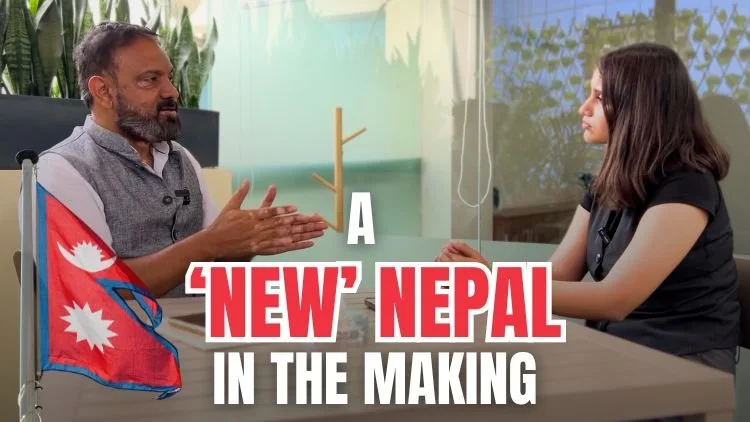
Is it the Beginning of a ‘New’ Nepal?
Nepal has been making global headlines after a mass youth uprising forced Prime Minister K.P. Sharma Oli to resign, paving the way for an interim government led by former Chief Justice Sushila Karki. Triggered by a controversial social media ban, the protests quickly grew into a movement against corruption, nepotism and authoritarianism. Nineteen Gen Z protesters were killed in police firing on September 8, sparking nationwide grief and anger, but also a surge of hope for change. For the first time, Nepal has appointed a woman as interim prime minister, and a cabinet of non-partisan professionals is attempting to steer the country toward elections in March 2026.
Political thinkers, activist and youth groups like Hami Nepal are now shaping the idea of a “new” Nepal through citizen assemblies, proposals for decentralised governance and calls for institutional reform. Newsreel Asia’s Harshita Rathore spoke with Prashant Singh, a social activist from Nagarik Pratham, to understand what this moment means for Nepal’s political evolution, the grassroots nature of the movement, and the new political imagination young Nepalis are bringing to the table.

Who Was Nepal’s PM Oli Scared of?
Was Nepal’s PM K.P. Oli scared of Gen Z and the emerging young political leaders? In the guise of “regulating” apps, was his real aim to tighten control over the content being posted against him and his government?
When his administration banned 26 social media platforms overnight, it triggered one of the biggest youth uprisings Nepal has ever seen. What began as anger over losing WhatsApp, Instagram, and even LinkedIn quickly turned into a fight against corruption, unemployment, and years of failed governance. This wasn’t just a protest — it was a generational roar demanding change.

What 9 Communities Taught Me Over Dinner
What do India’s persecuted communities go through behind closed doors? What happens when you sit across a dinner table and truly listen? Over the course of 9 powerful episodes, The Dinner Table, a docu-series by Newsreel Asia, brings together stories from communities who have long been silenced, sidelined, or targeted — simply for their identity, faith, or beliefs.

Meet India’s Youngest Journalists: Living and Reporting from the Streets
Among the tens of thousands of newspapers published in India, one stands truly unique — Balaknama (Children’s Chronicle). Curated by street children, the Delhi-based Balaknama brings powerful stories about underprivileged children and their surroundings in several cities across India. These children have lived the hardships they write about, giving their journalism rare authenticity and depth. Through Balaknama, they now have a platform to voice their issues and challenges.

Exposing West Bengal’s Corruption Crisis
West Bengal has grappled with a deep-rooted corruption crisis for decades—today, at the heart of it lies the School Service Commission (SSC) teachers’ recruitment scam, which has shattered the hopes of thousands of deserving candidates. In this investigative video, we uncover how teaching jobs were allegedly sold for lakhs of rupees, replacing merit with money in one of the state’s most crucial sectors — education.

Blood and Ballots: Political Violence in West Bengal
Ajaharuddin, a primary school teacher, witnessed his family's life take a devastating turn when his brother was allegedly attacked by workers affiliated with the Trinamool Congress (TMC) party, just a day before the 2023 Panchayat elections in West Bengal. The incident revealed the perilous state of democracy in their village.
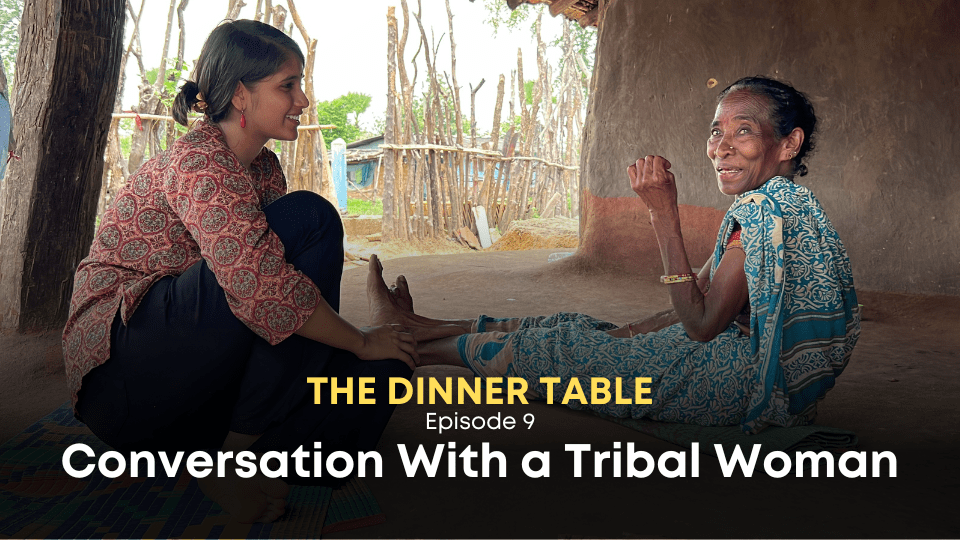
Dinner With a Tribal Woman: ‘My Sons Weren’t Maoists’
An elderly woman, Shanti Devi, who lost two of her sons in a shootout by security personnel, resides alone in a Maoist-affected region of Chhattisgarh. This episode of The Dinner Table explores her story.
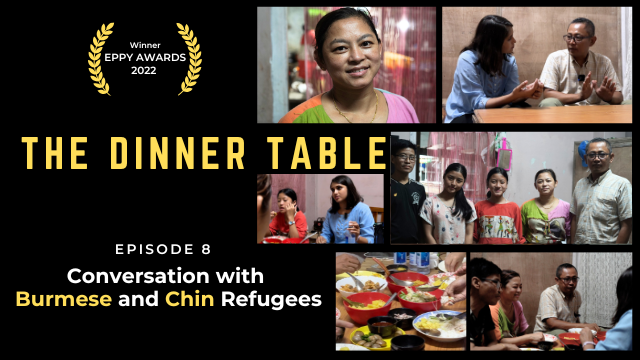
Dinner With Burmese and Chin Refugees
Ma Su and her family, Burmese refugees, have made Aizawl, Mizoram their home for the past several years after escaping Myanmar. She is one of nearly 40,000 Burmese refugees who have found refuge in Mizoram since the military coup in February 2021, many of whom are from the minority Chin Christian community. What drives these refugees to leave their homes? What kind of lives do they lead here, and what are their expectations of the local community? In this episode of The Dinner Table, host Harshita Rathore cooks a meal with Chin and Burmese refugees and sits down with them to share the meal while engaging in heart-to-heart conversations.

DINNER WITH A KUKI-ZO LEADER | Demand for Autonomy
It's been over 16 months since ethnic violence erupted in the northeastern state of Manipur, involving the majority Meitei community and the Kuki-Zo tribes. The resulting divide is so severe that an unofficial border has effectively separated the two communities within the state. As the violence carries on, efforts by the state and central governments to resolve the crisis appear minimal, and the future remains uncertain. To gain insight into what lies ahead, host Harshita Rathore sat down for dinner with a Kuki-Zo leader, Dr. Chinkholal Thangsing, who heads the Kuki People’s Alliance. Affectionately known as Dr. Lal, he proposes a solution he believes could potentially lead to lasting peace.
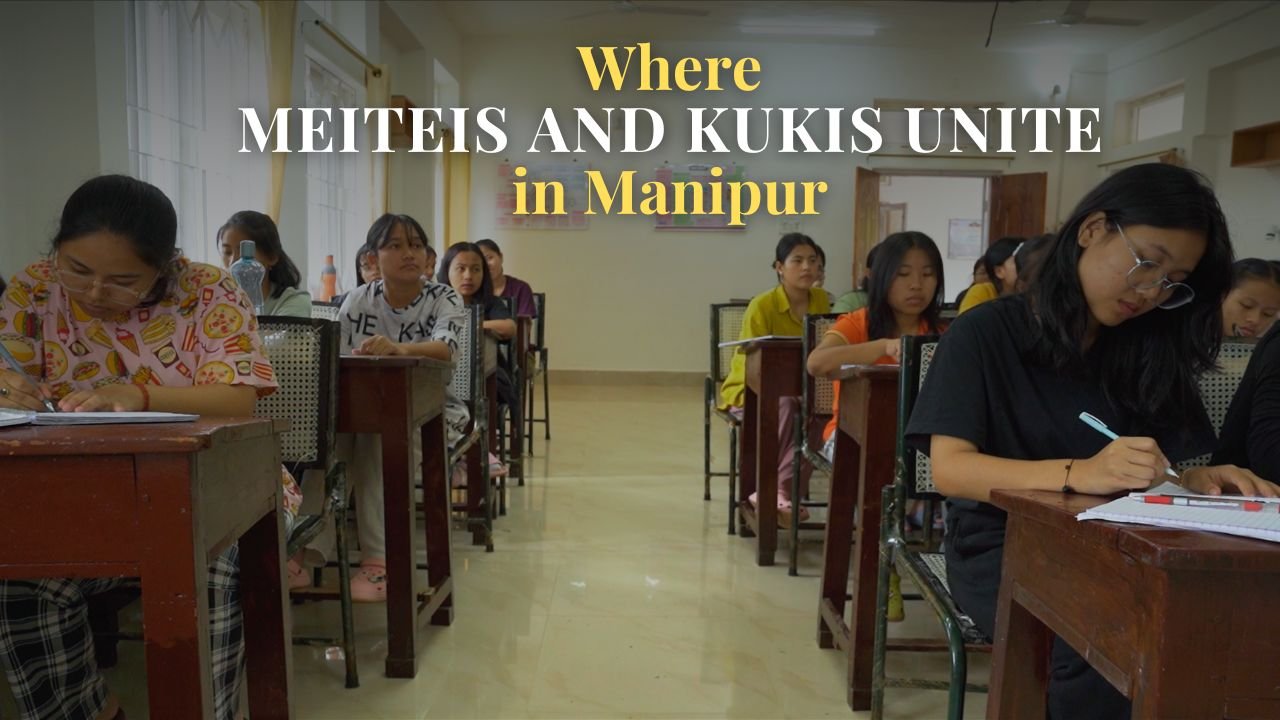
Where MEITEIS AND KUKIS UNITE in Manipur
Amid the 15-month ethnic divide between the majority Meitei community and Kuki-Zo tribes in Manipur, there is a place where youth from both groups come together for their future and education. In a special educational project run by the NGO NIEDO and the Assam Rifles, a paramilitary force, young girls and boys from both groups unite, believing that leaving the past behind and focusing on the future is key to restoring peace in violence-stricken Manipur. Despite the state’s deep divisions, these students hold onto the hope of one day reconnecting with friends from other communities.

Himalayan High and Lows | Drug Addiction and Himachal’s Youth
Chetan Shyam, a 27-year-old from Shimla in Himachal Pradesh, was a bright student inspired by his revered grandfather. His life took a drastic turn when he first consumed ‘bhaang,’ a locally popular cannabis derivative, as a child. In Himachal Pradesh, where cannabis cultivation and consumption are culturally ingrained, drugs are easy money and a gateway to more dangerous substances. Chetan also spiralled into synthetic drug addiction, abandoned his education, and turned to drug peddling to sustain his habit, leading to his social downfall. He believes societal shame on addicts perpetuates their struggle, driven by a system of greed involving locals, complicit police, drug mafias and politicians.
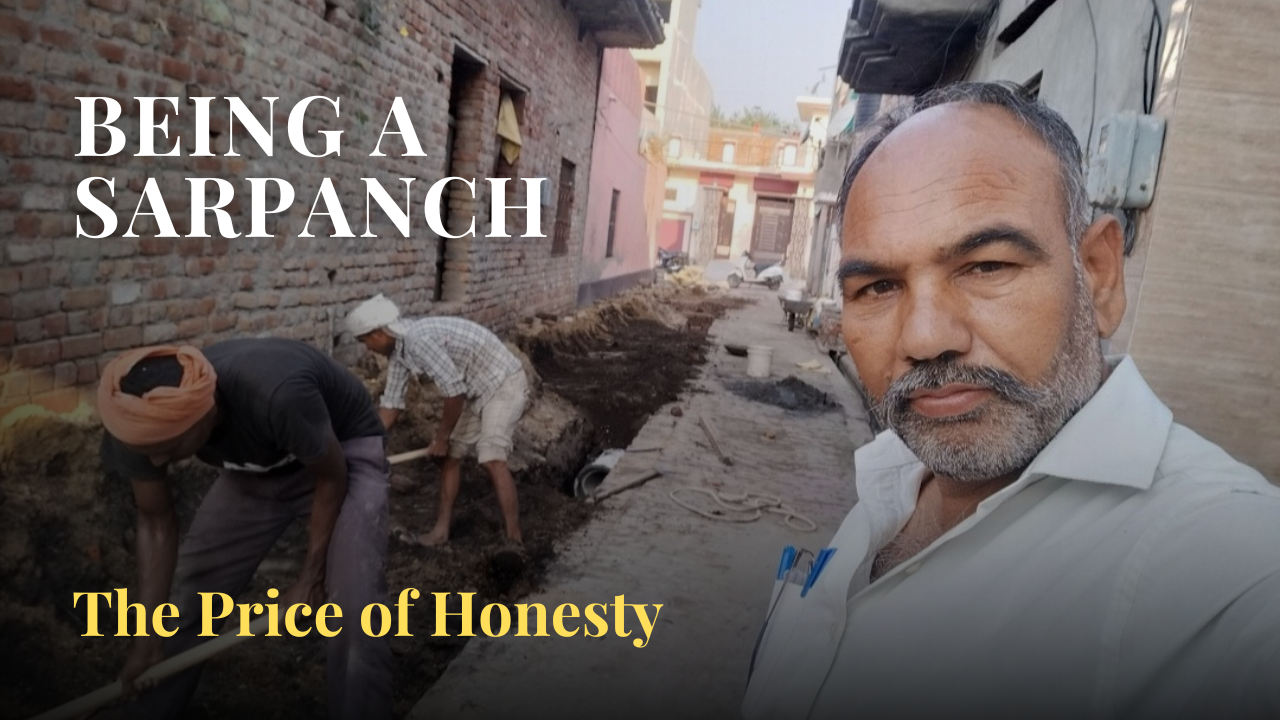
BEING A SARPANCH | The Price of Honesty
(WATCH): Raj Kumar Rana, a Dalit Sarpanch from Nurpur Village in Punjab, has been committed to the development of his community. Despite his earnest efforts, state-level party politics have significantly hindered his progress. The Panchayati Raj system, designed to empower local communities and promote responsive governance, faces challenges when state politics intrude. In the case of Sarpanch Rana, his firm stance leads to unforeseen consequences for him and his family.
